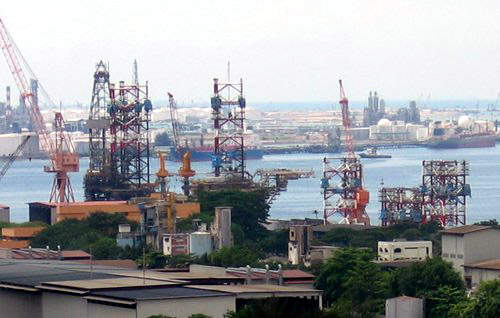
The Singapore Parallel Train (SPT) project is an integrated petrochemicals project that started construction in the refinery and chemical hub of Jurong Island in Singapore. It is integrated with the existing Singapore Chemical Plant (SCP), which will provide investment and operating synergies. Construction of the world-scale SPT started in November 2007. This $4bn project is scheduled for start-up in early 2011.
The Jurong Island petrochemicals industry accounts for $25bn of the Singaporean economy. In 2009, about 65,000 personnel were employed on Jurong Island.
Singapore is the Asia Pacific hub for ExxonMobil’s downstream and chemical businesses. The SPT project was instigated by ExxonMobil as an extension of its existing presence with a 605,000bpd refinery – one of the largest in Jurong, which means that feedstocks will not be a problem.
When complete the petrochemical complex will be the largest project owned and operated by ExxonMobil.
SPT project details
The SPT will consist of downstream units including a steam cracker ethylene complex and two downstream plants for the production of ethylene and propylene derivatives such as ethylene oxide, ethylene glycol, acrylonitrile, propylene oxide, cumene / phenol, oxo alcohols, acrylic acid and isopropyl alcohol.
The new plant will integrate with existing ExxonMobil plants at the refining and chemical complex including its aromatics and oxo-alcohol units, which will also be refurbished and expanded to an overall capacity of 125,000 tonne a year.
ExxonMobil’s goal is to push ethylene production in Singapore up to two million tonnes a year; the new plant will allow the company to achieve an increase in its yearly production to 1.8 million tonnes.
The Singapore Economic Development Board (EDB), which supports the SPT project, wants to increase the total ethylene production of Singapore’s petrochemical industries up to six million tonnes a year – the SPT will push the figure to about four million tonnes a year.
The project will also involve the construction of two 650,000tpa polyethylene units, a 450,000tpa polypropylene unit, a 300,000tpa speciality elastomers unit and an aromatics extraction unit, which will produce 340,000tpa of benzene.
The SPT will use the proprietary technologies of ExxonMobil and produce polyethylene and Vistamaxx speciality elastomers for the growing Asian market. The plant will also have a 220MW power cogeneration facility.
SPT project details
In January 2006 Foster Wheeler (FW) was awarded the contract to work on the early phase of the project including the initial feasibility and the front-end engineering and design (FEED) and project coordination and services.
The SPT project was undertaken by FW in conjunction with joint venture partner Worley Parsons.
In October 2007 the final investment decision was made on the $4bn complex and the FW / Worley Parsons joint venture was awarded a further contract for the engineering, procurement and construction (EPC) of portions of the plant. This included all the non-licensed technology, but not the ethylene steam cracker.
The contract involves the construction of new units and their integration into the existing plant.
The Shaw Stone and Webster joint venture was awarded a contract in June 2007 to construct an olefins recovery facility and power cogeneration unit for the SPT ethylene cracker (the Technip and Chiyoda joint venture was the losing bidders).
The contract includes the provision of technology and EPC services for a 800,000t to one million tonnes a year olefins recovery facility and a 220MW power cogeneration unit for the SPT (the cost of this section of the project was estimated at $1.3bn).
Other players
The SPT will involve many lucrative contracts for locally based Asian engineering companies.
ExxonMobil won the design and EPC contract for the steam cracker recovery unit to The Shaw Group. The EPC contract for the steam cracker furnaces was awarded to Mitsui Engineering and Shipbuilding and Heurtey.
Mitsui Engineering and Shipbuilding was also awarded EPC contracts for the polypropylene and speciality elastomers units.
The EPC contract for the two polyethylene units was given to Mitsubishi Heavy Industries. Hiap Seng Engineering was awarded parts of the engineering and construction work.
Rotary Engineering is another Singapore oil and gas infrastructure services company, which won contracts worth $200m (the company has bid on the subcontract for the construction of the ethylene cracker) along with OKP Holdings from ExxonMobil for the SPT.


